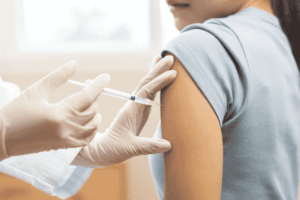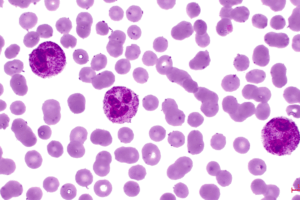How Do Vaccines Work? A Simple Guide to the Immune System and Immunization
Vaccines save lives. Period.
Take the flu shot. (No, really, take it.) During the 2023-2024 flu season, influenza vaccines prevented:
- 9.8 million flu-related illnesses
- 120,000 hospitalizations
- 7,900 deaths
And that’s just one vaccine. Throughout your life, you’ll likely be vaccinated against as many as 21 dangerous or deadly diseases, including hepatitis B, polio and tetanus. Each shot protects not only you but everyone around you.
But how do vaccines work, exactly? Take a breath (and look away if you have to) while we administer a dose of vaccine knowledge.
First Things First: What Are Vaccines?
A vaccine is a medical treatment that teaches your body how to defend itself against a specific disease — before it even shows up. Vaccines can be administered as a shot, pill, nasal spray or liquid.

How Do Vaccines Work?
To put it simply, vaccines imitate an illness without actually causing the illness.
Vaccines contain either:
- a weakened version of the virus or bacteria, or
- the biological blueprints for producing a harmless piece of it, called an antigen
This antigen triggers an immune response, and your body responds by creating antibodies: proteins that attack foreign substances like bacteria and viruses.
Think of your immune system as a nightclub bouncer. Getting a vaccine is like showing the bouncer (white blood cells) a photo of a known troublemaker (antigen). The next time that troublemaker shows up, they can’t get past the door (antibodies).
An Inside Look at Vaccines and Your Immune System
White blood cells, also called leukocytes, are your body’s defenders. There are five total types of white blood cells, but the three that fight and prevent infection are:
- Macrophages: the body’s alarm system
- T cells: the attackers
- B cells: the antibody factories
Created in your bone marrow, these cells circulate through the blood stream, slipping through blood vessel walls and tissue in search of foreign substances. When one is found, they rally other white blood cells to defend your body.

How Vaccines Trick Your Body Into Making Antibodies
When you receive a vaccine, here’s what happens:
- Macrophages spot the antigen and signal T cells to attack the fake threat.
- Cytotoxic T cells destroy the antigen-infected cells.
- Suppressor T cells prevent other T cells from attacking the body.
- B cells produce targeted antibodies to take down the antigen.
And here’s the important part:
Your body also produces antibody-producing memory cells that can launch a faster, stronger defense next time. Even if you still get sick, vaccines help your body fight back and make the odds of ending up in the hospital (or worse) lower. Way lower.
What Is Full Immunity — and How Do You Get It?
But wait! You might not be immunized yet. A single vaccine dose provides only partial protection, and the number of doses needed to achieve immunization depends on whether the antigen in the vaccine is alive or dead.
- Live-attenuated vaccines (like the one for chickenpox) contain a live, weakened bacteria or viruses. You usually only need one or two doses for lifelong protection.
- Non-live vaccines (like those for influenza and COVID-19) require three or more doses to build up immunity. These viruses mutate quickly, demanding vaccine boosters: updated vaccines for an updated threat.
Why Are Vaccines Important?
Vaccines protect you and your loved ones from preventable diseases. But here’s why vaccines matter even if you feel fine.
Some people can’t get vaccinated, like those with a weakened immune system or a severe allergy to vaccine components. But they can be protected if enough people around them are vaccinated.
This kind of group protection is called herd immunity.
When enough community members are vaccinated or immune, diseases can’t spread as easily. That means fewer outbreaks, fewer hospitalizations and fewer lives lost.
Getting vaccinated is one of the easiest ways to save lives. Honestly, they should hand out medals with every Band-Aid.
Want to Do More Than Just Get the Shot?
While we don’t have a lollipop or colorful bandage to send you away with, we can leave you with sound advice:
If you’re passionate about protecting public health — especially in a time when vaccines and science are constantly under fire — you don’t have to sit on the sidelines.
The University of Florida offers numerous online medical science programs that can help you step up and make a difference, whether you’re interested in medicine, pharmaceuticals or education.
If you’re ready to commit yourself to public health, apply to one of UF’s online medical science programs. Because just like vaccines, one small decision can save lives.
Sources:
https://www.who.int/news-room/feature-stories/detail/how-do-vaccines-work
https://www.cdc.gov/vaccines/basics/explaining-how-vaccines-work.html
https://medlineplus.gov/ency/anatomyvideos/000137.htm



